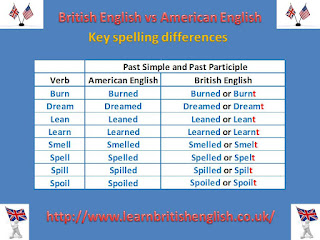- Verbs
1.1 Past Tenses
1.1.1 Simple Past
When we form the Simple Past, we usually add –ed to the verb and drop the “to”, for example waited (to wait), worked (to work) and watched (watch). There are several exceptions like saw (to see) and had (to have). Verbs like learn, smell and spell belong to another category, we can either add –ed or –t. In American English, the regular -ed form is always used in the past participle of the verbs like lean (leaned), learn (learned), smell (smelled), spell (spelled), and often used with the verbs burn (burned) and dream (dreamed). These forms are sometimes used in British English too, but British speakers most often use the forms leant, learnt, smelt, spelt,
burnt, and dreamt . So, they use the irregular form.
There are also verbs which are regular in British English and irregular in American English, for example fit (fitted in British English and fit in American English), the verb to dive also follow this rule.

1.2 Present Tenses
1.2.1 Present Perfect
In British and American English we use the Present Perfect to express an action that has happened in the recent past and has an effect on the present. For example: I have lost my keys, I need them to go to work. In American English it is also possible to say: I lost my keys. In British English this would be incorrect. We form the Present Perfect by the conjugation of the verb have and the past participle.
The Present Perfect is mostly indicated by adverbs as never, yet and already. The difference between American English and British English is the place of the adverb. In American English you can place the adverb before or after the past participle. In British English you can only place it after the Past Participle. For example in American English you can either say: I already have had lunch today or I have already had lunch today. In British English it is only possible to say: I have already had lunch today.
We can also say that Americans use the Present Perfect tense less than speakers of British English. This could depend on the view on time. For an American yesterday is a long time ago whereas it is in the recent past for a Brit. For example an American would say I went to work on Monday while a British speaker would say I have gone to work on Monday.
1.3 Future Tenses
1.3.1 Verbs shall and take
In British English it is normal to use the verb shall when you talk in the first person about the future. In American English this is not a very common way, for Americans do not often use the verb shall in their sentences.
For example the British English sentence I shall never read any other book. In American English the verb shall will become the verb will, making the sentence I will never read any other book.
1.3.2 Verbs shall and should
If you ask for advice, an opinion or make an offer in British English, it is most of the times by using the verb shall. For American English this does not apply, there the form should is more popular to use.
Like the question Shall I compare thee to a Summer’s day? will turn in American English in Should I compare thee to a Summer’s day?. The meaning of the sentence has changed by using a different verb. The verb shall expresses an action which takes place in the future, while the verbshould expresses a recommendation.
1.4 Verbs have and take
In British English the verb have is often used as a delexical verb. This means having little or no meaning on its own, but it is used in combination with an object noun which describes an activity. For example have in the British English sentence I’d like to have a bath is most of the times switched with take in American English. Which changes the sentence to I’d like to take a bath.
2 Collective and proper nouns and their verbs
In British English, singular nouns that describe multiple people are mostly treated as plural. But in American English the singular form is usually used. For example in British English you would say The team are happy and in American English you would say The team is happy. But Americans prefer the use of the plural form when the individual membership is clear, for example, The team take their seats (not The team takes its seats). When we read a text we see that phrases are often reformed to avoid the singular/plural decision, so you would say The team members take their seats. The difference applies for all collective nouns such as team, people and company. It also applies on proper nouns e.g. James, Tuesday, The President and London. Proper nouns, which are plural in form, have a plural verb in both American and British English. For example if you talk about a band (proper noun) in British English you say The Clash are a well-known band. But if you would say this in American English you would say The Clash is a well-known band,
because Americans prefer to use the singular form when you describe a group.
When the proper noun is already in plural, the verb also is in plural in both American and British English such as The Beatles are a well-known band.



No hay comentarios:
Publicar un comentario